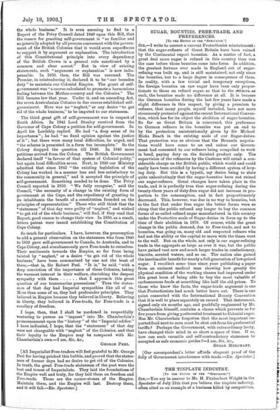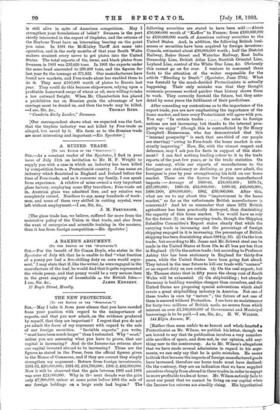THE TINPLATE INDUSTRY.
LTO THN EDITOR OF TEl " SPECTATOR.1
SIR,—You say in answer to Mr. H. Fitzherbert Wright in the Spectator of July 11th that you believe the tinplate industry, often cited as an example of a business killed by competition,
is still alive in spite of American competition. May I strengthen your foundations of belief ? Swansea is the port chiefly interested in the export of tinplates, and the returns of the Harbour Trust have an interesting bearing on the point you raise. In 1891 the McKinley Tariff Act came into operation, and in the early months of that year South Wales makers strained every nerve to get plates into the United States. The total exports of tin, terne, and black plates from Swansea in 1891 was 233,020 tons. In 1901 the exports under the same head amounted to 239,489 tons, and the figures for last year fix the tonnage at 271,832. Our manufacturers have found new markets, and Free-trade alone has enabled them to do it. They sent 2500,000 worth of plates to Russia last year. They could do this because shipowners, relying upon a profitable homeward cargo of wheat or oil, were willing to take a low outward freight. When Mr. Chamberlain has placed a prohibitive tax on Russian grain the advantage of low carriage must be denied us, and then the trade may be killed.
—I am. Sir, &c., THOMAS REES. "Cambria Daily Leader," Swansea.
[Our correspondent shows what we expected was the fact, that the tinplate industry was not killed by Free-trade as alleged, but saved by it. His facts as to the Russian trade are most interesting and important.—En. Spectator.]











































 Previous page
Previous page